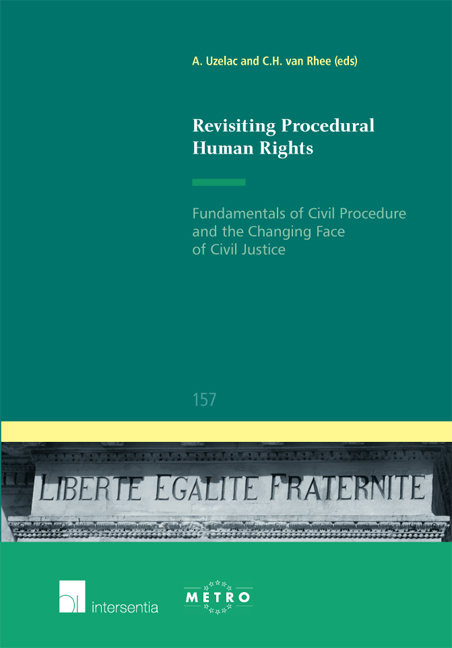 Revisiting Procedural Human Rights
Revisiting Procedural Human Rights Book contents
- Frontmatter
- Table of Contents
- List of Authors
- List of Abbreviations
- Acknowledgements
- Introduction
- The Human Right to Accessible and Foreseeable Justice
- The Inconsistency of Case Law and the Right to a Fair Trial
- Misgivings about American Exceptionalism: Court Access as a Zero-Sum Game
- Should Fair Trial Rights be Redefined? Civil Litigation as a Societal Discussion
- Fundamental Procedural Rights from a National Angle
- Wheels of History: Fair Trial Rights in Historical Perspective
- Equal Justice for all: Empirical and Normative Approaches to Legal Aid and Assistance in Civil and Administrative Cases
- Ius Commune Europaeum
Should Fair Trial Rights be Redefined? Civil Litigation as a Societal Discussion
from The Human Right to Accessible and Foreseeable Justice
Published online by Cambridge University Press: 13 October 2018
- Frontmatter
- Table of Contents
- List of Authors
- List of Abbreviations
- Acknowledgements
- Introduction
- The Human Right to Accessible and Foreseeable Justice
- The Inconsistency of Case Law and the Right to a Fair Trial
- Misgivings about American Exceptionalism: Court Access as a Zero-Sum Game
- Should Fair Trial Rights be Redefined? Civil Litigation as a Societal Discussion
- Fundamental Procedural Rights from a National Angle
- Wheels of History: Fair Trial Rights in Historical Perspective
- Equal Justice for all: Empirical and Normative Approaches to Legal Aid and Assistance in Civil and Administrative Cases
- Ius Commune Europaeum
Summary
New Type of Court Scenes
In post-modern court culture, the communication and interaction between the parties and the judge is receiving major attention. There has been a big change away from adjudication, the ideals of substantive law and a substantively correct judgment and towards the ideal of negotiated law and a pragmatically acceptable compromise. This means that the decision maker and the parties will be active actors and a solution will be based on working together. The role of the judge is to assist the parties in finding a solution instead of being an authoritative decision maker. Sometimes mediation carried out by the judge has even been seen as the main function of adjudication, which is a significant sign of the completely new paradigm in the procedural world. The development has shifted from judicial power towards court service where the parties can be seen as clients. At the same time there has been wide discussion on the ultimate functions of civil litigation.
Proceedings have even been seen as micro-politics and the place for moral discussions. Issues which earlier belonged to the political system are nowadays sometimes discussed in court. This is owing to the welfare state. It is not enough that the outcome is produced in a legitimate system according to legitimate rules. Legal security has not only the meaning that rules are followed formally, but also substantive meanings like the protection of the weaker party. Legal decisionmaking is not just about logical syllogisms, it is more about discussion with good arguments and grounds having more content compared to form only. However, the courts may not create new legal principles based on their own moral views, but what they do is that they supplement and balance the instrumental views of the legislator when needed by injecting human and fundamental rights into the decision-making. Therefore, cases can have societal meaning beyond the courtroom. The discussion and argumentation during the proceedings can be more interesting from the general point of view than from the perspective confined to the individual case and concerned ‘only’ with the particular result for that case. Proceedings are scenes within which to test the validity of legal values and often even to start new societal discussions on important topics.
- Type
- Chapter
- Information
- Revisiting Procedural Human RightsFundamentals of Civil Procedure and the Changing Face of Civil Justice, pp. 77 - 92Publisher: IntersentiaPrint publication year: 2017
- 1
- Cited by


